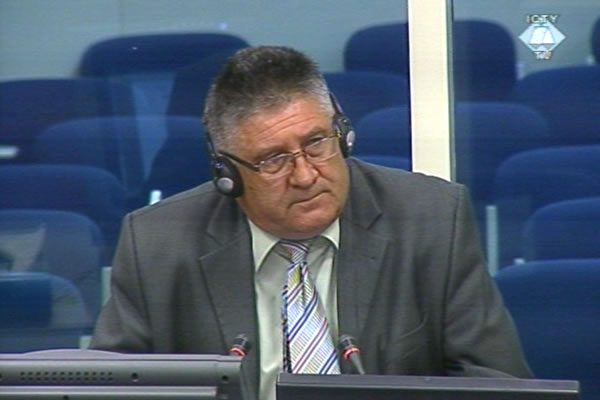Home
DENYING SNIPER AND ARTILLERY TERROR IN SARAJEVO
In his evidence at the trial of Radovan Karadzic, Blagoje Kovacevic, former commander of the 3rd Infantry Battalion of the VRS 1st Sarajevo Motorized Brigade, said that the Serb forces didn't use snipers and mortars to target civilians in Sarajevo
 Blagoje Kovacevic, defence witness of Radovan Karadzic
Blagoje Kovacevic, defence witness of Radovan Karadzic Radovan Karadzic’s defense case continued today. Karadzic tried to counter the accusations that during the war Serb forces ‘shelled Sarajevo without any cause’. As his third witness, Karadzic called a brigadier in the BH Joint Armed Forces, Blagoje Kovacevic. During the war, Kovacevic commanded the 3rd Infantry Battalion of the VRS 1st Sarajevo Motorized Brigade.
Karadzic read out a summary of Kovacevic's written statement. The statement contains key elements of the defense case: that the VRS didn't launch attacks on Sarajevo, that fire was opened only in self-defense and not to cause civilian casualties and terrorize the population. The BH Army used portable mortars to open fire on Serb positions mostly from areas in close proximity of hospitals and other protected facilities to cause the Serb forces to respond, the witness said in the statement. Also, the witness said that the BH Army staged incidents to provoke a response of the international community. Kovacevic's statement was admitted into evidence and Karadzic had no further questions for him.
Before the cross-examination, Judge Kwon told the witness he had the right to refuse to answers any questions that may be self-incriminating. The Trial Chamber could force him to reply, judge Kwon explained, but in that case answers couldn't be used against Kovacevic in court except in a trial for perjury.
At the beginning of the cross-examination, prosecutor Edgerton asked the witness to confirm if the Orthodox church in the village of Veljine, the barracks in Lukavica, most of Ozrenska Street, the skyscrapers in Grbavicka Street, the monument to the World War II fighters in Vrace and the positions at Osmice and Zlatiste were in the zone of responsibility of the witness's brigade. According to the indictment, snipers frequently fired on the citizens of Sarajevo from those locations.
Kovacevic claimed there were no 'trained' snipers in his brigade, but did admit there were persons armed with rifles with optical sights. However, by extension, as Kovacevic noted, 'all hunters would be considered snipers'. Prosecutor Edgerton asked the witness how he would describe Nebojsa Ivkovic's group: they fired from sniper rifles from a skyscraper in Grbavica. The witness replied that Ivkovic played no role at all', adding that there were persons who wanted to look like 'members of special units'.
The prosecutor asked Kovacevic to define what in his view constituted 'indiscriminate fire'. That, the witness explained, would be 'senselessly firing on civilians from any kind of weapon in order to terrorize the population'. The prosecutor then confronted the witness with a report filed by the UN military observers, who stated that on 7 and 8 January 1994 the VRS fired 175 projectiles on Sarajevo. Fifty percent of the rounds, the report stated, hit residential civilian areas killing 10 and injuring 35 persons. When she asked Kovacevic what he would call this kind of military action, he said that as an officer, he found the UN military observers' report too ‘universal’. The report didn't indicate where and how the victims were killed and injured and he couldn't comment on it.
After Blagoje Kovacevic completed his evidence, Karadzic called Dusan Skrba, former commander of the VRS Mixed Artillery Battalion in Lukavica. He will continue his evidence on Monday, 22 October 2012.
Linked Reports
- Case : Karadzic
- 2012-10-17 KARADZIC 'AMENDS' WITNESS'S STATEMENTS
- 2012-10-17 DEMURENKO DENIES HE ENJOYED SPECIAL TREATMENT FROM VRS
- 2012-10-16 COLONEL DEMURENKO'S PRIVATE INVESTIGATION OF MARKALE MASSACRE
- 2012-10-22 KARADZIC'S WITNESS: 'DON'T ASK ME ABOUT ARTILLERY'
- 2012-10-22 TV NEWS AS SOURCE FOR VRS INTELLIGENCE
- 2012-10-23 TARGETS OF MODIFIED AIR BOMBS
